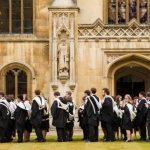One-fourth of secondary school staff report having seen sexual harassment in their place of work.
According to a survey of mostly female support staff, members revealed that sexual harassment is still ‘rife’ in UK schools. Several of them reported experiencing improper sexual comments and physical harassment from male students as well as colleagues.
Ten percent of secondary school staff who answered the survey said they had been sexually harassed, while another 25% claimed they had witnessed sexual harassment at their place of work in the past five years. 7% of the school staff at all stages had suffered sexual harassment.
A female learning support assistant at Hertfordshire school described an instance in which a student attempted to kiss her and push her head towards his crotch. According to other respondents, male students tried to touch or slap a staff member’s bottom.
According to a teaching assistant in Wales, “I work in a primary school. Three fifth-grade boys attempted to embarrass me by making crude jokes about ‘shagging up the arse’ and “Do you like cum, miss.”
On most occasions, harassment is directed by male students towards female students. “boys pushing girls and holding them down to kiss them, playing games called the ‘rape touch’ and commenting on girls’ bodies, according to teaching in the southwest.
In other instances, head teachers and other male staff mistreat their female coworkers. According to a survey, “headmasters texted another staff member, asking to see pictures of how her operation goes. She had undergone breast enhancement surgery.
According to the contributor, a head teacher told his female staff member to “stand here and look pretty; I will do the taking.” Two out of five staff members (42%) who witnessed abusive incidents claimed that they did not report them because they felt it was pointless.
The survey conducted by Unison and UK Feminista will add to concerns that little has changed since the anti-rape campaign Everyone’s Invited revealed shocking rates of sexual abuse and misogyny in schools.
In an assessment conducted at the time of the time, Ofsted, the school inspectorate, found that sexual harassment had become normalized for youth in school, online, and in other unsupervised settings like packs and house parties.
Unison urged the next government to protect teachers and students from harmful sexist language, attitudes, and actions. The report states, ” Staff members need to know how to address these issues, and they will be taken seriously when they report concerns.”
Christina McAnea, general secretary of Unison, stated that “parents will be horrified to learn that their children are being taught in such toxic environments.” “The risk is that when students grow up and enter the adult world, the language and behavior they learn stays with them.
Nina Humphries, deputy director of UK Feminista, added that “it is quite alarming that misogyny is so accepted in schools. This fuels violence against women and girls and limits the aspirations of young people.”
The publication of the findings coincides with the start of the Unison’s annual conference in Brighton on Tuesday. Staff members in UK nurseries (9%), primary schools (46%), secondary schools (31%), special schools (8%), all-through school (2%) and pupil referral units (1%).













